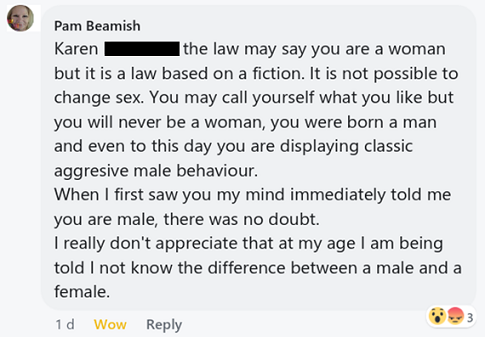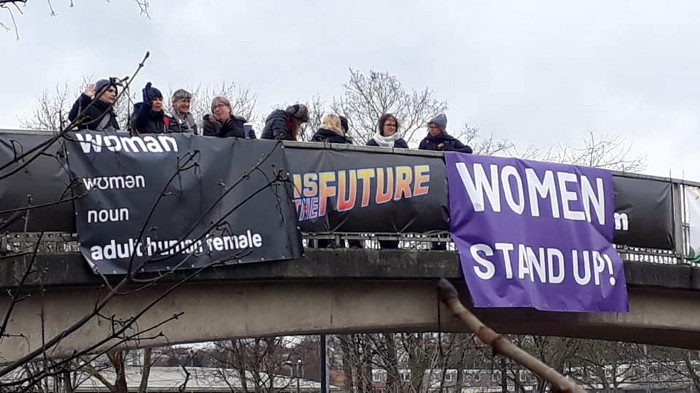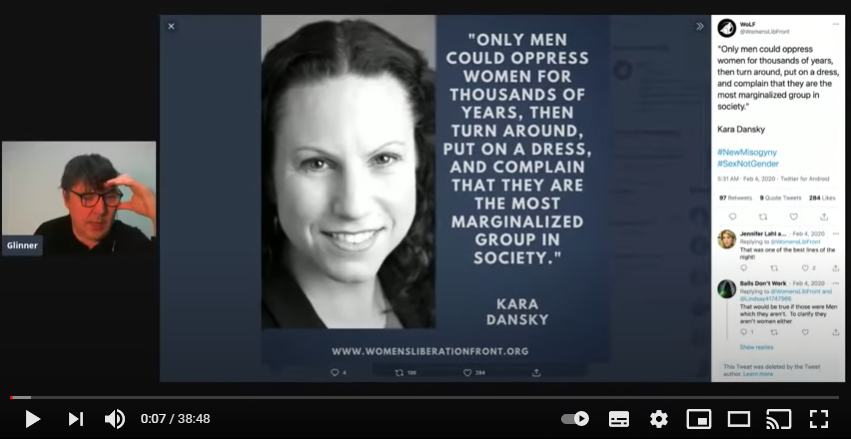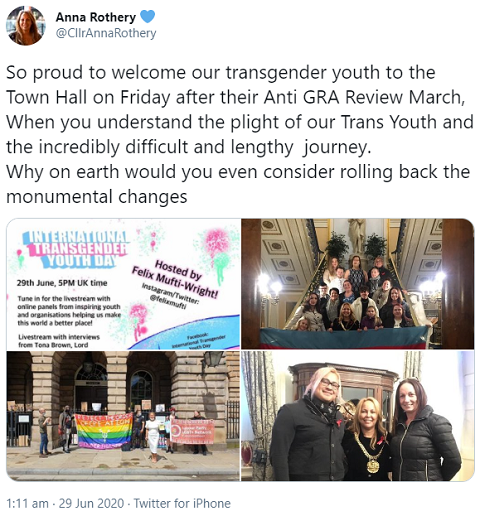Transphobia, free speech and the left

Earlier this month an online Stand Up For Labour Party Democracy rally was organised to build a campaign in solidarity with those members unjustly suspended from the party. One of the speakers listed in advance publicity for the meeting was Esther Giles of the Save Our Socialists group, who was herself suspended last year because, as Bristol North West CLP secretary, she had allowed members to vote on a motion calling for Jeremy Corbyn’s reinstatement to the party. However, following objections to her presence as a speaker at the meeting the organisers withdrew the invitation.
In a Twitter thread complaining about having been “no-platformed”, Giles offered this account of her exclusion: “The reason: three years ago, I supported a comrade who was being pressured to make a statement about trans women and to say that she believed ‘Transwomen are Women’. My feeling was that, regardless of the issue of the debate — nobody should be bullied into saying something they don’t believe.”
 I’m told this is a reference to a Bristol Labour Party member named Pam Beamish. During a discussion in a local Labour left Facebook group in 2018 Beamish informed a trans woman party member with a gender recognition certificate that the legal position with regard to her identity was irrelevant:
I’m told this is a reference to a Bristol Labour Party member named Pam Beamish. During a discussion in a local Labour left Facebook group in 2018 Beamish informed a trans woman party member with a gender recognition certificate that the legal position with regard to her identity was irrelevant:
“the law may say you are a woman but it is a law based on a fiction. It is not possible to change sex. You may call yourself what you like but you will never be a woman, you were born a man and even to this day you are displaying classic aggressive male behaviour. When I first saw you my mind immediately told me you are male, there was no doubt. I really don’t appreciate that at my age I am being told I [do] not know the difference between a male and a female.”
The trans woman member reacted with understandable outrage to the comment and threatened Beamish with both legal action over hate speech and a complaint to the Labour Party. I’m not sure how that qualifies as bullying, but Esther Giles thought it did. She stated that she objected to a trans woman “telling women how ‘woman’ is defined … threatening us with the law because we don’t agree with you, frightening us”. She went on to argue that because men usually possess greater physical strength than women they can use this to subject women to violence, and so “it is the biology that counts and not the piece of paper. I stand with Pam Beamish”.
Giles’ explanation of the motive behind her exclusion from the Stand Up For Labour Party Democracy platform implied that she was neutral on the question of whether trans women are women and had merely defended Beamish on anti-bullying grounds. This won her widespread sympathy. Yet it is clear that Giles agrees with Beamish on the issue of trans women, even if she avoids expressing this view in such inflammatory language.

Here is Giles (third from left) in January 2019, demonstrating in Bristol with a small group of “gender critical” activists. The “adult human female” banner on display was produced by the transphobic organisation Standing For Women and is intended precisely to reject the view that trans women are women. It had been the subject of controversy a few months earlier, when the extreme anti-trans militant and Standing For Women founder Kellie-Jay Keen-Minshull (aka Posie Parker) paid to have it displayed as an advertisement in Liverpool during the 2018 Labour Party conference, as a protest against the city council’s support for trans rights. Angrily complaining about the subsequent decision to remove her advertisement, Keen-Minshull described the idea that trans women are women as “preposterous”.
Last year Giles stood for the post of Labour Party treasurer. The Labour Party LGBT+ Network put a series of questions to candidates, the first of which was: “Do you accept that trans women are women, trans men are men, and non-binary people are non-binary — and will you commit to respecting trans people as their self-declared gender — if so, how will you integrate this approach to tackle the culture of entrenched transphobia, from the grassroots membership up to the leadership?” In response Giles just sent a bland general statement of her opposition to discrimination and failed to answer these specific questions.
Still, her position on trans women did win Giles support in some quarters. It got her onto the approved list of NEC candidates compiled by the Labour Women’s Declaration group, which was launched in 2019 with Giles as a founding signatory, in order to defend the “women’s sex-based rights” that were supposedly threatened by the Labour Party’s policy of reforming the Gender Recognition Act and Equality Act 2010 to provide greater protection for trans people. Graham Linehan for his part was “delighted” to offer his website as a platform for the promotion of Giles’ candidacy (“A woman to look out for: Esther Giles”). In a reference to the Pam Beamish dispute, the author of this article, Labour Party member Kate McEwan, applauded Giles for having “stood by a friend who was being hounded on social media by a trans-identified male [sic]”. For good measure, she added the trans woman’s name.
Linehan’s endorsement was particularly revealing, because the Father Ted co-creator is notorious for his obsessive hostility towards the recognition of trans women as women, which he expresses in such an aggressive and unhinged manner that some have tried to excuse his behaviour on the basis that he has mental health issues. Following numerous complaints about his anti-trans tweets, last year Twitter eventually imposed a permanent ban on Linehan, stating that he had been responsible for “repeated violations of our rules against hateful conduct”. As Owen Jones commented at the time: “The degeneration of Graham Linehan from celebrated comedian into an online troll who spent 24/7 bullying trans people, and particularly women who support trans rights, was extremely grim. This was a long overdue decision by Twitter.”
Yet in 2019, in the face of mounting objections to Linehan’s online activity, Giles signed an “Open letter in support of Graham Linehan’s challenges to gender identity ideology”, which hailed this obnoxious individual as “one of the few public figures to stand up for women” and complained that he had been “subjected to repeated smears and abuse”. Apparently oblivious to Linehan’s record of hateful conduct towards trans women and their allies, the letter declared: “We welcome his involvement in this debate.”

Other attacks on trans rights that Giles has signed up to include a statement asserting that trans women pose a potential physical threat to cis women, a letter to the Sunday Times headed “Trans ideology is damaging children” and the declaration of the Women’s Human Rights Campaign — a group that recently called for the abolition of the Gender Recognition Act and the elimination of “transgenderism”. In Bristol Labour Party it was complaints about Giles’ position on trans rights, and in particular her support for Pam Beamish, that led to the Local Campaign Forum turning down her application to stand for selection as a Labour candidate in the local elections. Giles’ subsequent appeal to region against this decision was also rejected — a ruling that was reportedly influenced by her recent tweeting of an article titled “Trannies are the new nazis”.
So Giles’ claim that she was blocked from appearing as a platform speaker at the Stand Up for Labour Party Democracy event just because she had supported a friend who was being bullied was disingenuous to say the least.
For some on the left, though, it would appear that agitating against equality for trans women in cooperation with hardline transphobes is not a sufficient reason for withdrawing a speaking invitation. As Jewish Voice for Labour put it in their official statement opposing the decision to disinvite Giles: “Denying a platform to anyone is an absolute last resort for behaviour so egregious that there is no room for doubt. Normally it is reserved for those promoting fascist views. It should not even be considered for those whose opinions we simply disagree with — however strongly.” But the reference to fascism only muddies the waters.
First of all, it’s not the case that no-platforming is reserved for fascists. As Evan Smith details in his informative study No Platform: A History of Anti-Fascism, Universities and the Limits of Free Speech, when it was first adopted by student organisations in the 1970s the principle of no platform was directed against racists as well as fascists, and it was subsequently also used against sexists, homophobes and anti-abortionists. The more recent extension of the principle to include transphobes really isn’t much of a stretch.
Secondly, there is the question of what type of “no-platforming” is being applied. I doubt the organisers of the Stand Up For Labour Party Democracy meeting take the view that Giles should be prevented, physically if necessary, from appearing on any public platform, as has been done to fascists. The issue in this case was whether someone who is alleged to have a history of encouraging transphobia was an appropriate person to put on as a speaker at a leftwing meeting.
This was an entirely legitimate question to ask — just as it would be legitimate to ask whether someone with an alleged record of homophobia or Islamophobia was an appropriate speaker at such a meeting. Few on the left would respond to that question by arguing that as long as the individual concerned was only a homophobe or an Islamophobe and not a fascist, there could be no objection to having them on the platform.
At a subsequent meeting organised by Labour Against the Witchhunt, to launch a Labour Campaign for Free Speech, Giles claimed that she was disinvited from the Stand Up For Labour Party Democracy event because one speaker refused to share a platform with her and the organisers were worried that other speakers might pull out too.
 This was evidently a reference to councillor Anna Rothery, currently Lord Mayor of Liverpool, who was the left’s favoured candidate for the city’s upcoming mayoral election before she was bureaucratically removed from the selection contest following an interview in which she called for the whip to be restored to Jeremy Corbyn.
This was evidently a reference to councillor Anna Rothery, currently Lord Mayor of Liverpool, who was the left’s favoured candidate for the city’s upcoming mayoral election before she was bureaucratically removed from the selection contest following an interview in which she called for the whip to be restored to Jeremy Corbyn.
I don’t know whether Anna Rothery did in fact refuse to share a platform with Giles. However, given Giles’ record on transphobia, which included posing with the same Standing For Women banner used to attack Rothery and other Liverpool councillors over their admirable support for trans rights, you can well understand why she might have reacted in that way.
Giles herself, it turns out, is something of a free speech absolutist. As she explained in her contribution to the Labour Campaign for Free Speech meeting, the only restriction on free speech she would contemplate is that it “should not (in my view) promote acts of violence”. According to that logic, we should be arguing for the abolition of the law against incitement to racial hatred, which has been on the statute book since 1965 and has provided at least a measure of protection for BAME communities against the hate propaganda of the far right.
But then, Giles does support freedom of expression for fascists. She says that free speech “shines a light on bad arguments and hate, rather than letting it fester in dark corners — for example, arguably, the BNP collapsed following Nick Griffin’s appearance on Question Time in 2009”. More arguably, the BNP collapsed following its disastrous local election results in 2010, which were mainly the result of the fact that these coincided with a general election and the BNP was unable to reproduce its earlier success in winning council seats on the basis of low turnouts. A contributory factor was an anti-fascist campaign that among other things called for no-platforming the BNP. The point here, though, is that Giles rejects the principle of no platform even in the case of fascists.

Giles is active in the defence of University of Bristol lecturer David Miller, who is under threat of losing his job because of a Zionist campaign to smear him as an antisemite. There is a tendency to present this primarily as a free speech issue, which I think is problematic. The emphasis should rather be on defending Professor Miller because the accusation is false and he’s not an antisemite. If he were, then the pro-Israel Jewish students who are rallying support for their demand that the university authorities must take action against him would have a point, just as Muslim students do when they call for action against another Bristol University lecturer who they accuse of Islamophobia.
From Giles’ standpoint, though, it doesn’t matter whether David Miller is antisemitic or not. According to her line on free speech, people have the right to promote both antisemitism and Islamophobia (and of course transphobia too) as they see fit, without any sanction, so long as they stop short of advocating violence. It should go without saying that this is not a tenable position for the left.
What we see here is the confusion that prevails among some leftwingers over the issue of free speech. Instead of objectively assessing each concrete situation, they declare — with the sort of dogmatic insistence you would more usually associate with rightwing libertarians like Spiked — that the right to free speech must be upheld irrespective of the context. We can certainly disagree on the circumstances in which restrictions on free speech should apply, and what type of restrictions are appropriate in a given situation, but robotically repeating that we always have to defend free speech is no substitute for reasoned argument.
All this takes place against the background of a rightwing war against so-called “cancel culture”, which targets the “woke” left as enemies of freedom and defends the right of racists, Islamophobes, homophobes and transphobes (though not generally antisemites, oddly enough) to promote bigotry, discrimination and hatred without restraint. The argument that the left can best resist this attack by embracing the principle of untrammelled free speech strikes me as entirely misconceived. By conceding the false argument that leftwingers are engaged in an authoritarian attempt to suppress ideas they disagree with, it just plays into the hands of the rightwing culture warriors.
First published on Medium in February 2021